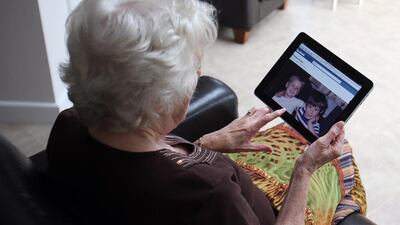They say that of all human emotions, Schadenfreude — the sense of luxuriant well-being that steals over us when we hear of someone else’s misfortune – is perhaps the least attractive of all. And yet I succumbed to a hefty helping of it this week, upon hearing that Apple’s contactless payment system, ApplePay has had a troubled start in the UK.
Their idea is simple. Technology permits shoppers to purchase anything that costs less than £20 simply by waggling your iPhone in the general direction of the till. What could be easier? The way things are going, not only will cash and credit cards be redundant, soon you won’t even need a wallet.
Such a ground-breaking commercial initiative was always going to have teething problems – in this case, while there are 250,000 shops with compatible tills across the UK, some bank cards don’t yet work with the service.
ApplePay is the latest technological initiative to widen the gulf between those who are connected and those who are not. Soon, it seems, everything will be controlled by your smartphone.
Meanwhile, for those of us left behind, the sense of disenfranchisement only increases. There is something quietly heartbreaking about seeing the over-60s trying to cope with a culture from which they are marginalised.
You see them everywhere nowadays: on railway station concourses, in municipal car parks and in shopping malls, standing disconsolately studying the instructions on some complex automated machine or jabbing haplessly at their phone screens, without which they find they can’t buy a train ticket, park their car or book an appointment.
Their distress is most evident in supermarkets. Premises that were once manned by counter-staff who knew you by your first name and who would flash you a welcoming smile when you entered the shop, have all but disappeared. Now the only thing flashing at you when you come to pay are the lights and electronic gizmos on the automated self-scan checkout machines. No chance for a chat about the weather with these stony custodians of commerce. Indeed, the only fragment of conversation they’re likely to offer is “unexpected item in the bagging area.”
Still, there might be a silver lining for those of us who, like me, are being left behind. A survey published this week by the American Feinberg School of Medicine has concluded that overreliance on a phone – particularly when linked to high volume of use and a static geographic location – can lead to depression.
The survey, published in the Journal of Medical Internet Research, found that depressed people on average spend more time on their phones than non-depressed people.
Apparently individuals using mobiles to excess are likely to avoid thinking about painful feelings or relationships, “an avoidance behaviour we also see in depression”, or so claims David Mohr, one of the study’s authors and a professor of behavioural psychology.
If so, perhaps there’s some hope for dinosaurs like me, who still prefer to see the world through our eyes than through a tiny rectangular screen welded to our fingers. We may not be able to buy anything or go anywhere, but if Mr Mohr is to be believed, at least we’re happy.
As for those millions of others who are switched on, tooled up and surely heading one day for mental oblivion, the survey has one crumb of comfort that may provide salvation before it’s too late. By wiring the user’s Smartphone via a GPS tracking system to a central computer terminal and comparing the amount of time spent on it with the user’s changing geographical locations, Mr Mohr suggests it may be possible to correlate valuable pre-emptive data. In other words, users at the risk of becoming depressed through overreliance on technology could be offered medical intervention before it’s too late. You see? Soon you won’t even be able to feel glum without your phone having something to say about it.
Michael Simkins is an actor and writer who lives in London
On Twitter: @michael_simkins

